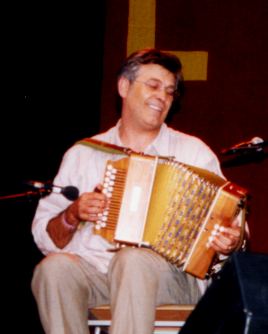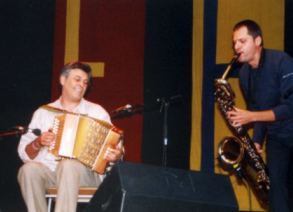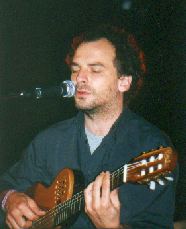FolkWorld article by
Michael Moll:
Melodeon Music with many languages
Riccardo Tesi & Banditaliana - one of the greatest Italian bands
 "When
I started, people admitting that they played the diatonic accordion were very
much like mars men or UFOs. Nobody knew the instrument: 'What do you play? Diatonic
Accordion??? What is that?' This was normal, nobody knew anything about it."
Things have changed quite a lot since then, back in 1978. And Riccardo Tesi
has had his share in reviving the accordion in Italian folk music. Today he
is one of the outstanding melodeon players in the Italian folk scene. With his
new band Banditaliana, he is creating innovative and rather superb music crossing
borders especially towards Jazz. Michael Moll met the sympathetic Italian in
the far North, at the Falun Folkmusik Festival.
"When
I started, people admitting that they played the diatonic accordion were very
much like mars men or UFOs. Nobody knew the instrument: 'What do you play? Diatonic
Accordion??? What is that?' This was normal, nobody knew anything about it."
Things have changed quite a lot since then, back in 1978. And Riccardo Tesi
has had his share in reviving the accordion in Italian folk music. Today he
is one of the outstanding melodeon players in the Italian folk scene. With his
new band Banditaliana, he is creating innovative and rather superb music crossing
borders especially towards Jazz. Michael Moll met the sympathetic Italian in
the far North, at the Falun Folkmusik Festival.
1978 was the year when Riccardo came for the first time across a musician
playing the diatonic accordion. He did not know then that it would change his
life radically. With his 24 years, he directly fell in love with the instrument
and said 'This is my instrument'. Soon he stopped to study, to dedicate all
of his time to learn and play the accordion.
Before that he had not been in touch with traditional Italian music - he started
with traditional music only when starting the diatonic accordion. He had used
to listen to Rock, Jazz, Songwriter, and he played "very badly" guitar.
"When I started, it was very difficult to find documents and records; nobody
played this instrument in Tuscany, the region where I come from. So I had to
move to the South of Italy, to Sardinia, to see and learn from the traditional
players. This has been my school; I just learned by ear. And little by little
I tried to become more and more a musician, and less an accordion player." He
started to compose his own music and developed his very own style.
 So
the roots of Riccardo's accordion style are more in Southern Italy. Yet today
he does not play much traditional music. "I started a long time ago with traditional
music because it is the vocabulary of my instrument. But I was not born as traditional
musician. If I want to be honest, I don't play traditional music, I just do
my music. Because I compose, and when you compose it is not traditional. I use
all what I learned about traditional music to compose, similarly like Bella
Bartoc, he used traditional ideas to compose classical music. I try to do it
in the same way." He adds with a laugh: "Surely we won't have the same result."
So
the roots of Riccardo's accordion style are more in Southern Italy. Yet today
he does not play much traditional music. "I started a long time ago with traditional
music because it is the vocabulary of my instrument. But I was not born as traditional
musician. If I want to be honest, I don't play traditional music, I just do
my music. Because I compose, and when you compose it is not traditional. I use
all what I learned about traditional music to compose, similarly like Bella
Bartoc, he used traditional ideas to compose classical music. I try to do it
in the same way." He adds with a laugh: "Surely we won't have the same result."
"This is my way: To do new music, music of today, but with a lot of memory.
At the same time, I use all the ideas of music that I learnt: about Jazz, about
Song, etc." For Riccardo, this kind of fusion of different music styles is typical
for today; it is difficult to find a very pure style. His recipe for a successful
fusion is "to do it in a personal way, and not just marmalade. You need to have
a strong idea of what you want."
 Parallely
to Riccardo's early ventures on the accordion, the folk music movement started
to grow up. For Riccardo - and for the reputation of the diatonic accordion
- it has been rather important that he was invited to play with Jazz musicians
as well as well known Italian songwriters with a large audience. Even the late
Fabrizio De André asked him to play on his album. "It means that there is a
very strong interest to this sound, so it is a big chance for us, because we
can have a large public."
Parallely
to Riccardo's early ventures on the accordion, the folk music movement started
to grow up. For Riccardo - and for the reputation of the diatonic accordion
- it has been rather important that he was invited to play with Jazz musicians
as well as well known Italian songwriters with a large audience. Even the late
Fabrizio De André asked him to play on his album. "It means that there is a
very strong interest to this sound, so it is a big chance for us, because we
can have a large public."
Riccardo thinks that these collaborations have had a rather big impact on the
accordion: "Now the diatonic accordion is an instrument, just a little bit strange,
but most people know that it is an instrument, this is a big result."
Riccardo thinks that with these collaborations with well-known songwriters
"our music stops to be too much folk, too much ghetto, so it can speak to other
kind of people." He thinks that you have to adapt with your music to the modern
society: "A century ago it was OK to play a twenty minute long ballad, but now
you have to speak very shortly, the timing is completely different. If you are
musician who does not want to play archaeologic music but music of today, you
have to think about it. In Jazz, Myles Davis also started to play very short
tunes, which was very clever. But it is not only for being clever and selling
more. It is just that the language is changing. You have to stay in your time."
Since rather recently Riccardo Tesi has his own band showcasing wonderfully
his music ideas, yet bringing in plenty of new ideas from the talented band
member. Banditaliana is actually the first time that Riccardo plays with musicians
from his home region Tuscany. Before he used to play a lot with international
musicians, "with people very far from me, musically and geographically." He
still likes to do that, but he felt that he needed now a band project where
you have plenty of time to experiment together, a band with members from the
same region, so that practising is easy.
 For
Banditaliana he found highly talented and imaginative musicians, bringing a
wonderful choice of instruments together. Maurizio Geri is the sensitive and
distinctive singer and guitarist otf the band, having both a knowledge of Folk
and Jazz music (he used to play Django Reinhard's guitar style). The percussion
player Ettore Bonafè from Florence has an ethnic approach to the music: He studied
Tabla in India, he knows rhythms from Africa, and has also played Jazz. Finally,
Saxophone player Claudio Carboni comes from an Italian dance music style corresponding
to the French Musette, so he has a very staccato phrasing on the sax. All these
musical backgrounds are in Banditaliana successfully melted. The material is
to a big extent composed by Riccardo Tesi, along to some traditionals and songs
from comtemporary songwriters.
For
Banditaliana he found highly talented and imaginative musicians, bringing a
wonderful choice of instruments together. Maurizio Geri is the sensitive and
distinctive singer and guitarist otf the band, having both a knowledge of Folk
and Jazz music (he used to play Django Reinhard's guitar style). The percussion
player Ettore Bonafè from Florence has an ethnic approach to the music: He studied
Tabla in India, he knows rhythms from Africa, and has also played Jazz. Finally,
Saxophone player Claudio Carboni comes from an Italian dance music style corresponding
to the French Musette, so he has a very staccato phrasing on the sax. All these
musical backgrounds are in Banditaliana successfully melted. The material is
to a big extent composed by Riccardo Tesi, along to some traditionals and songs
from comtemporary songwriters.
"Everything we play we try to play in our way, with our sensibility, in our
musical world."
Banditaliana play in very different contexts, mainly on Jazz Festivals and
Folk & World Festivals, but also beyond that. "I am happy about it, because
I think there is only good music and bad music. I am happy to open our music
to young people. Now when we play our audience is very broad - from teenagers
to older people. I am happy about it because I like to speak many languages,
making only one music."
One of Riccardo Tesi's recent CDs was reviewed in FolkWorld
No. 17. The latest CD is still awaited by FolkWorld's review panel.
The label of Riccardo is Felmay.
Contact to Riccardo by e-mail is rictesi@tin.it.
Photo Credit: All photos by The Mollis, taken at the Falun
Folkmusik Festival
Back to the content of FolkWorld Articles, Live Reviews & Columns
To the content of FolkWorld
online magazine Nr. 20
© The Mollis - Editors
of FolkWorld; Published 12/2001
All material published in FolkWorld is © The Author via FolkWorld. Storage for private use is allowed and welcome. Reviews and extracts of up to 200 words may be freely quoted and reproduced, if source and author are acknowledged. For any other reproduction please ask the Editors for permission.
FolkWorld - Home of European Music

Layout & Idea of FolkWorld © The Mollis - Editors of FolkWorld
 "When
I started, people admitting that they played the diatonic accordion were very
much like mars men or UFOs. Nobody knew the instrument: 'What do you play? Diatonic
Accordion??? What is that?' This was normal, nobody knew anything about it."
Things have changed quite a lot since then, back in 1978. And Riccardo Tesi
has had his share in reviving the accordion in Italian folk music. Today he
is one of the outstanding melodeon players in the Italian folk scene. With his
new band Banditaliana, he is creating innovative and rather superb music crossing
borders especially towards Jazz. Michael Moll met the sympathetic Italian in
the far North, at the Falun Folkmusik Festival.
"When
I started, people admitting that they played the diatonic accordion were very
much like mars men or UFOs. Nobody knew the instrument: 'What do you play? Diatonic
Accordion??? What is that?' This was normal, nobody knew anything about it."
Things have changed quite a lot since then, back in 1978. And Riccardo Tesi
has had his share in reviving the accordion in Italian folk music. Today he
is one of the outstanding melodeon players in the Italian folk scene. With his
new band Banditaliana, he is creating innovative and rather superb music crossing
borders especially towards Jazz. Michael Moll met the sympathetic Italian in
the far North, at the Falun Folkmusik Festival. So
the roots of Riccardo's accordion style are more in Southern Italy. Yet today
he does not play much traditional music. "I started a long time ago with traditional
music because it is the vocabulary of my instrument. But I was not born as traditional
musician. If I want to be honest, I don't play traditional music, I just do
my music. Because I compose, and when you compose it is not traditional. I use
all what I learned about traditional music to compose, similarly like Bella
Bartoc, he used traditional ideas to compose classical music. I try to do it
in the same way." He adds with a laugh: "Surely we won't have the same result."
So
the roots of Riccardo's accordion style are more in Southern Italy. Yet today
he does not play much traditional music. "I started a long time ago with traditional
music because it is the vocabulary of my instrument. But I was not born as traditional
musician. If I want to be honest, I don't play traditional music, I just do
my music. Because I compose, and when you compose it is not traditional. I use
all what I learned about traditional music to compose, similarly like Bella
Bartoc, he used traditional ideas to compose classical music. I try to do it
in the same way." He adds with a laugh: "Surely we won't have the same result." Parallely
to Riccardo's early ventures on the accordion, the folk music movement started
to grow up. For Riccardo - and for the reputation of the diatonic accordion
- it has been rather important that he was invited to play with Jazz musicians
as well as well known Italian songwriters with a large audience. Even the late
Fabrizio De André asked him to play on his album. "It means that there is a
very strong interest to this sound, so it is a big chance for us, because we
can have a large public."
Parallely
to Riccardo's early ventures on the accordion, the folk music movement started
to grow up. For Riccardo - and for the reputation of the diatonic accordion
- it has been rather important that he was invited to play with Jazz musicians
as well as well known Italian songwriters with a large audience. Even the late
Fabrizio De André asked him to play on his album. "It means that there is a
very strong interest to this sound, so it is a big chance for us, because we
can have a large public." 